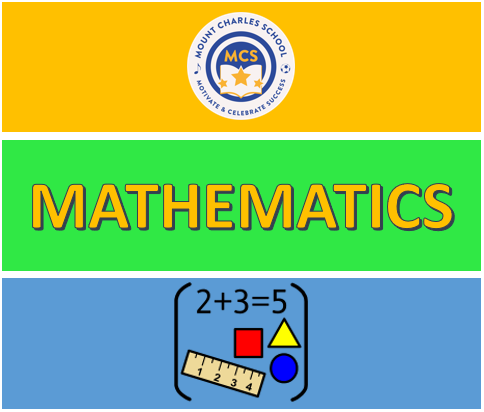 Proud to be a part of Cornwall Education Learning Trust
Proud to be a part of Cornwall Education Learning Trust

Mathematics

Intent
At Mount Charles, we follow a mastery approach to the teaching of the mathematics objectives laid out in the National Curriculum. It is our belief that all pupils can achieve and succeed in maths. In order for this to happen, our curriculum has been planned and implemented to ensure that every child has a sound understanding of the intricacies of mathematics. We aim for pupils to leave our school equipped with the mathematical skills and knowledge to enable them to thrive in life. Our aspiration is for every child to see themselves as a mathematician - demonstrating a confident attitude towards tackling problems both in and out of the classroom and understanding the importance of maths in the wider world.
Implementation
To ensure constancy and progression across the school, our main teaching and planning resource is the DfE approved Power Maths scheme, which is fully aligned with White Rose: we use White Rose to ensure coverage of the National Curriculum and Power Maths to deliver it. Power Maths is a clearly structured teaching and learning process that helps us make certain that every child masters each maths concept securely and deeply. For each year group, the curriculum is broken down into core concepts, taught in units. A unit divides into smaller learning steps – lessons. The sequence of lessons is designed to empower pupils to understand core concepts and grow in confidence. Pupils complete work in their Power Maths practice books which support the consistent use of models, images and approaches through the school, allowing pupils to draw on prior learning easily.
Power Maths brings together calculation, reasoning and problem solving in to a series of lessons, which ensures that secure links are made and that prior knowledge is tested and challenged throughout. Pupils are encouraged to solve problems each day through the use of concrete resources, pictorial representations and abstract thinking, the concrete, pictorial, abstract (CPA) approach. All pupils have access to manipulatives to aid them when tackling concepts in a tangible and comfortable way.
In addition, we place a strong emphasis on the power of questioning: this enables pupils to explore topics as a class and verbally develop reasoning skills during lessons. They are encouraged to take ownership of their learning through self and peer assessment and are encouraged to discuss errors and learn from mistakes.
Teachers and pupils mark work during the lesson so that pupils receive instant feedback about their learning and teachers adapt future planning in response to this. Number Stacks is used when additional one-to-one or small group intervention is needed to support pupils to keep up.
Every year group has a daily, twenty-minute fluency session: -
- Years 1 – 6 teach times tables and number bonds using the Mount Charles Times Table Planner document and the strategies out lined in the five day teaching timetable.
- Key Stage 1 follow the NCTEM Mastering Number program which aims to secure good number sense in all pupils by focusing on fluency in calculation and a confidence and flexibility with number.
- Key Stage 2 follow Fluent in Five which provides daily arithmetic questions to build number fluency and confidence. Pupils access Times Table Rock Stars in KS2 and Numbots in KS1 to aid with rapid recall of multiplication and division facts and number bonds. This resource is used in school and at home.
Impact
Subject Leader monitoring has shown:
- In 2022, 71% of Year 2 pupils reached at least the expected standard in maths at the end of KS1 and 71% (nat. 71%) of Year 6 pupils reached at least the expected standard in maths at the end of KS2 compared to 70% (nat. 79%) in 2019.
- 71% of all pupils made positive progress at the end of Key Stage 2 in 2022. o Pupils make positive progress from YR to Y6: 0.1 points progress in 2022 compared to -2 points progress in 2019.
- The attainment gap between disadvantaged pupils and non-disadvantaged pupils at end of Key Stage 2 is closing with a 4% difference between disadvantaged pupils and non-disadvantaged pupils in 2022 compared to 39% in 2019.
- The attainment gap between girls and boys at the end of Key Stage 2 is closing with 13.2% difference between girls and boys in 2019 compared to 8% in 2022.
- Pupils enjoy maths and are confident mathematicians across a range of concepts.
- Pupils of all abilities including those with SEND are able to succeed in maths lessons.
- Pupils of all abilities feel success in maths lessons.
- Pupils use a range of strategies to efficiently calculate mentally.
- Pupils have a secure understanding of written methods and can apply them appropriately.
- Pupils talk passionately and with confidence about their learning in maths.
- Pupils are able to access maths across the curriculum in their next stage of education.
- Teachers plan lessons which meet the needs of all learners including those with SEND and disadvantaged.
- Teachers are secure in their subject knowledge.
- Parents and carers have a good understanding of how they can support maths at home.
Impact of mathematics at Mount Charles School is carefully tracked and measured by:
- Termly PuMA assessments (Year 1-5);
- Termly past-paper SATs assessment (Year 6);
- Analysis of the PuMA assessments by the maths lead who subsequently shares action points and priorities with class teachers;
- Termly data meetings to review individual pupils’ progress as well as progress of the class and cohort;
- Half-termly monitoring of pupils’ maths outcomes in workbooks;
- Half-termly learning walks to monitor maths teaching – successes and feedback given to teachers;
- Number Stacks provision reviews on Edukey;
- Half-termly monitoring of maths outcomes in pupil workbooks;
- Half-termly learning walks to monitor maths teaching – successes and feedback shared with teachers.
- Pupil conferencing linked to maths.
